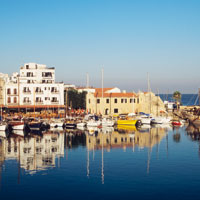To set up office in Cyprus has many benefits. Not only has the European Union Member State the lowest EU corporate tax rate in Europe, it also boast macroeconomic stability and a sound economic performance. Further advantages include sound accounting and banking services, as well as advanced infrastructure and telecommunications networks. No less important, the location of the island is convenient. It’s no wonder, then, that so many international businesses and shipping companies have chosen to settle in Cyprus.
Today, the offshore industry provides the island with a respectable chunk of business activity, not only due to the fact that some of the world’s greatest ship management companies operate headquarters in Cyprus.
Nicosia
Located in the central part of Cyprus, Nicosia is the capital of the island and serves as its administrative and financial centre. The Seat of Government and the Diplomatic headquarters are both based in town, and the locale is also home to several universities and colleges as well as a host of foreign embassies. Today, the city belongs in part to the Turkish north and in part to the Greek south; and the Green Line represents the boundary between the two sides.
Without a doubt the most important business hub of Cyprus, Nicosia is the largest city on the island and is home to about 250,000 inhabitants, which is a third of the total population of Cyprus. Owing to its multinational appeal and low tax rates, the spot is a definite draw for offshore companies, so much so that this particular industry accounts for a respectable part of Cyprus’s business segment. Since the city’s seen such an influx of international students and foreign workers, it has developed diverse culture and is decidedly cosmopolitan.Apart from offering business opportunities aplenty, Nicosia possesses many other attractive aspects. Speaking of the city’s fascinating history, it can be traced all the way back to the Bronze Age. Within the Venetian walls that enclose the ancient heart of the city nestles a plethora of intriguing sites, museums and other cultural establishments. The business districts, meanwhile, is located in the more cosmopolitan part of town outside the walls. Exuding an air of a busy and modern metropolis, the area is home to a fair number of commercial ventures and offices blocks, as well as a respectable smattering of beautiful Colonial buildings.
Limassol
With a population of 228,000, Limassol is the second-largest city in Cyprus. Located on Akrotiri Bay on the south coast of the island, the locale serves as the biggest Cypriot port in the Mediterranean transit trade. Being the ultimate trading centre of Cyprus, prominent industries span furniture, clothing, drinks, food, metal and electric devices. Furthermore, Limassol plays host to many of the wine companies of Cyprus. To mention but a few- SODAP, KEO, LOEL and ETKO all operate in the Limassol region, producing wine using grapes grown locally. Some of the wine is used domestically, but most of it is exported to Europe and other parts of the world.
Blessed with beautiful sandy beaches and glorious weather, it shouldn’t come as any surprise that Limassol also relies heavily on the tourist trade. A considerable part of the local population is employed within the tourism industry that is indeed the island’s main source of income. A draw for tourist and would-be business settlers alike, Limassol is known for its cultural wealth and offers a wide plethora of worthwhile museums and sites.
To explore the highly relevant archeological segment, The Archaeological Museum showcases a collection of antiquities dating from the Neolithic Age to the Roman period.
Offering a glimpse into the region’s folk art culture, The Folk Art Museum serves up a varied collection of Cypriot Folk Art; part of the collection date back two centuries.
Larnaca
Larnaca is the third largest city of Cyprus, and its resident airport, Larnaca International Airport, operates flights to all major European cities. As such, it’s the island’s most important airport, (ranked 64th in Europe’s 100 busiest)which makes the spot a particularly attractive option for international businesses looking to settle in a convenient spot. The closure of the Nicosia International Airport is no doubt behind the mounting importance of Larnaca as an international business hub, and the city’s economy has benefited greatly since its newfound prominence was established. To boost its appeal further, the airport recently benefited from a €650m upgrade. No less important, the Larnaca Marina serves as one of the four official entry points to Cyprus.
With a modest population of about 72,000, Larnaca is considered an important tourist resort, complete with an attractive seafront lined with palm trees. Boosting Larnaca’s economy significantly, the tourism and service sector employs three quarters of Larnaca’s labour force, and a host of airlines and other travel related companies have chosen to base their head offices in town.
In terms of culture and history, the ruins of Ancient Kitium count among the ultimate landmarks of the region. The earliest remains of the ruins date back to the 13th century BC, which makes the site a highly significant historical landmark.





